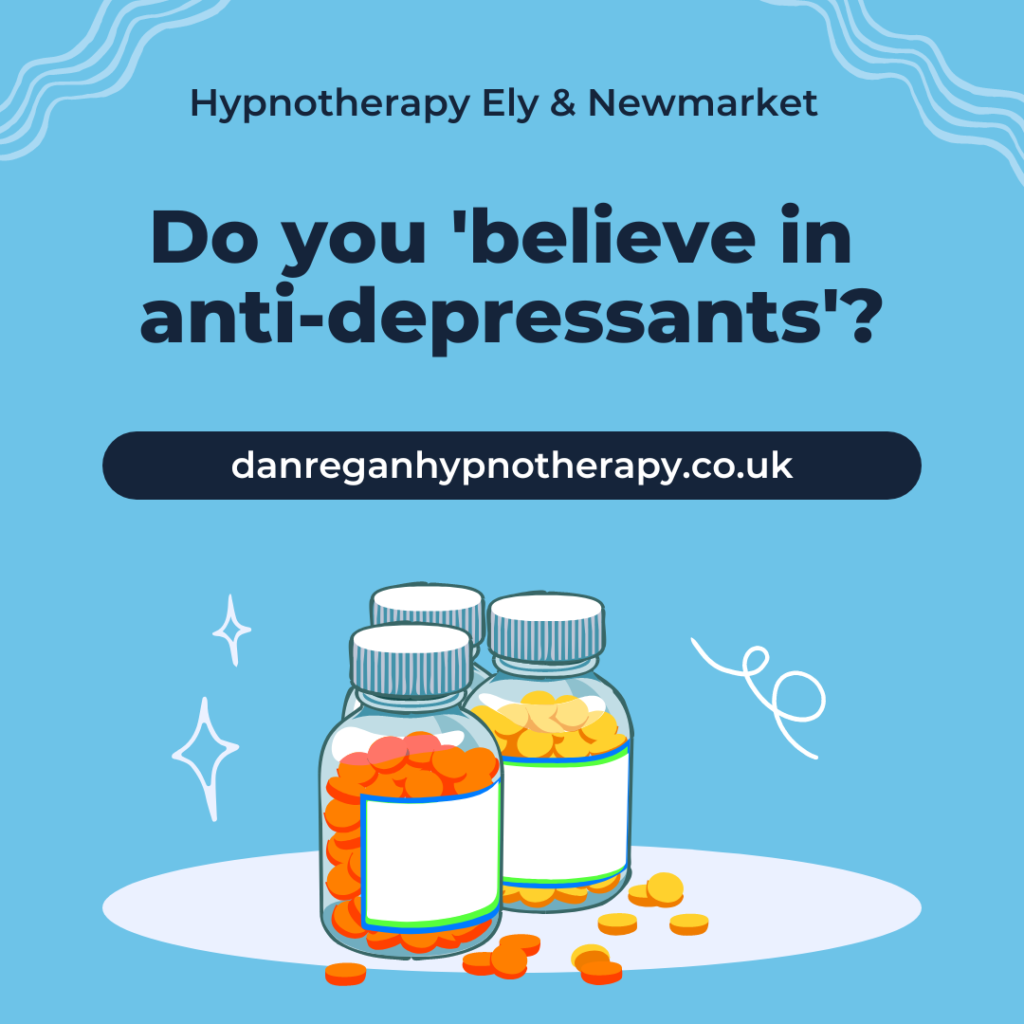
Do you ‘believe in anti-depressants’?
The other day a client was telling me how she’d spoken to a previous therapist before coming to work with me. That therapist had told her that she ‘didn’t believe in anti-depressants’. Now I don’t know about you but I find that rather an odd thing for a therapist to say to a prospective client having only met them for half an hour or so.
Now bear in mind that this client had been through some pretty upsetting and traumatic stuff, had visited their GP and, on the advice of the GP, was taking anti-depressants and having regular follow up reviews with their doctor. So for a non-medically trained therapist to turn around to the client (whose self-esteem was pretty way down there anyway) and effectively tell them they are doing stuff wrong seems pretty incredulous to me.
I’m going to apologise right now if it seems like I’ve got a bee in my bonnet about this but the fact it I have. I think it’s pretty insulting for a therapist to force their views and beliefs onto a client and, more than that, it shows a lack of respect to the client and to the medical profession as a whole. For some reason there are whole bands of therapists (of many types) out there who feel they are more qualified about medication than a doctor and who seem to think of doctors as nothing more than evil minions of powerful pharmaceutical companies with nothing better to do than dish out anti-depressants irrespective of the needs of their patient.
Which sounds pretty conspiratorial to me.
And of course these same people who ‘don’t believe in anti-depressants’ are way up near the front of the line to go and see their doctor if they need antibiotics or pain killers or who will take some paracetamol or ibuprofen if they are in discomfort or pain. I mean, do these therapists also go around telling clients in pain that they ‘don’t believe in painkillers’ because therapy can help with that, or telling someone going to the dentist for a procedure that they ‘don’t believe in anaesthetic’? Of course they don’t. What they mean is that they think they know better than anyone else when it comes to mental health and therefore everyone should fall into line with their views.
It’s not like you can even not believe in anti-depressants. We aren’t talking about whether someone believes in Santa, the tooth fairy or if Nessie is real (you know, things where we aren’t quite sure, are we?!). You can pick up an anti-depressant, you can hold it in your hand, you can even put it in your mouth and swallow it. It’s a real thing.
What’s more, there is research showing that anti-depressants do have an effect (see my article – Depression, Anti-Depressants & Mental Health – Do The Tablets Actually Work?). That study, which was published in the Lancet, looked at data from 522 studies, which included 116,477 patients who were taking one of 21 anti-depressant drugs or placebo. The report found that ‘all anti-depressants included in the meta-analysis were more efficacious than the placebo in adults with major depressive disorder.’ So the research shows that anti-depressants are doing something more than just a placebo effect with regards to adults with major depressive disorder. So someone saying that they don’t beleive anyone should be taking anti-depressants flies in the face of scientific research.
Now this is all far different from saying that the only way to combat depression and anxiety is with anti-depressants. There may be many reasons why it isn’t the best approach. Perhaps you don’t want to take pills and are seeking an alternative path to feeling better. Maybe your doctor has suggested other avenues you can pursue without medication. Maybe the side effects are so severe for you that they outweigh any benefits. Maybe you’ve tried them and they didn’t lead to any improvement in your condition. And there could be many more reasons why anti-depressants may not be for you. Yet isn’t the main thing here doing what is right for you as an individual? Isn’t it for you to decide on your own mental health treatment plan (in conjunction with others)?
We could all argue and debate whether teaching people resilience skills and educating them on how to handle stress and manage their mental health would reduce the number of people who need anti-depressants or who suffer with mental health conditions. We could all argue and debate that the health service needs more funding so people get other types of support quickly and effectively and so doctors have longer with their clients and more options for mental health treatment.
Yet the fact remains that if, right here and now today, someone finds taking anti-depressants useful or necessary, then they should not be vilified for it or made to feel inadequate. Such comments and views do the world of professional therapy a massive disservice. Each and every person who walks through the door of a therapist should be supported and helped as an individual, and where their situation, goals and beliefs are the primary focus.
Now of course it’s possible through effective therapy to overcome depression, anxiety and low self-esteem without needing anti-depressants. And for many others, the medicine will reduce their symptoms to a level where their therapy can be much more successful and they can develop the resilience and capability that gets them back on track and in a position to talk to their doctor about a gradual reduction in the tablets.
I’ve successfully worked with thousands of clients, many having come to me having already been taking anti-depressants (for days, weeks, months or even years) and many have made the decision that they want to pursue therapy as an alternative to medication. Each person needs to make the right decision for themselves and it’s our job as therapists to help them to the best of our ability along their chosen path.
And the fact is, if your therapist is stepping outside of their field of training, and acting as if they know better about medication than your doctor, then my advice would be to treat that like a huge red flag. Politely decline their services and seek out someone who will put you at the centre of your therapy.
To your success,
Dan Regan
Hypnotherapy Ely, Newmarket, Skype
Struggling with anxiety, stress, worry and fear and need some help? Find out how I can help with a Complimentary Hypnotherapy Strategy Session. Learn more here: Appointments
Find out what dozens of other people have said after their hypnotherapy sessions with Dan: Hypnotherapy Testimonials
And check out these powerful hypnosis downloads that can start helping you right away with anxiety, confidence and more: Hypnosis Downloads




0 Comments